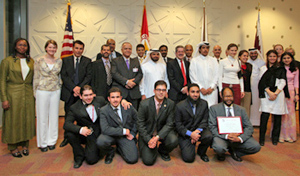Ceremony Honors Preceptors for their Role in MPS I

Dean Alonso addresses the audience
In a ceremony at the Medical College on Wednesday, May 4th, WCMC-Q recognized the important contribution of Hamad Medical Corporation (HMC) physicians to the clinical education of its medical students.
Held before an audience of members of the Class of 2008, faculty, staff and guests from the Qatar Foundation and HMC, the ceremony marked the completion of the first year of clinical preceptorships at primary healthcare centers and outpatient clinics of the departments of pediatrics and medicine at the Hamad Hospital.
Dean of WCMC-Q, Daniel R. Alonso, M.D., noted that this was the first annual event celebrating the important contribution of HMC physicians who are faculty at the Medical College. "This is a momentous occasion, another milestone in our Program, and an early and tangible demonstration that the partnership between WCMC-Q and HMC has tremendous momentum," he told the audience. "The preceptors have begun the clinical education of the next generation of physicians in Qatar."
Preceptorships are an integral part of the Medicine, Patients and Society I (MPS I) course which runs throughout the first year of the Medical Program. The course complements the study of the basic sciences and introduces the medical students to clinical practice.
Each week, they go out to the clinics to observe how physicians interact with patients, and to learn more about the importance of communication skills and professionalism in the practice of medicine.
This exposure to patient care is developed in two sequential MPS courses during the first two years of the Program, before the students embark on their clinical clerkships in the third year. It provides a gradual and comfortable introduction to medical practice that is "hugely motivational," Dr. Alonso said.

Preceptors, WCMC-Q Faculty and Medical Students
In her address to the assembly, Senior Associate Dean for Education, Elizabeth Alger, M.D., F.A.C.P., contrasted the remoteness of medical students from patients in the past with the situation today, where students have early and frequent exposure to clinical practice in doctors’ offices (clinics.)
Noting that Weill Cornell Medical College in New York was one of the first medical schools in the U.S. to introduce this new approach to clinical education, she went on to say that WCMC-Q is "one of very few outside the U.S. that offer such experience."
Dr. Alger outlined the goals of the preceptorships: learning to interact with the patient, to take a history, and understand the role of the physician in the therapeutic relationship. "Medical education has changed for the better," she added.
Dr. Alger noted that the experience had had a palpable effect on the Class of 2008. They were more self–confident, and demonstrated a greater understanding of the impact of family and environment on patients.
In their recent initial encounters with Standardized Patients - trained lay people who play the part of patients in the setting of the Clinical Skills Center at the Medical College — the students showed "great poise and professionalism."
Expressing appreciation for the contribution of the HMC preceptors, Dr. Alger concluded: "Our goals for the preceptorships have been fulfilled in very large measure."
Wendy Terry, M.D., course director for MPS I, presented certificates of appreciation to the following preceptors:
- Dr. Abdul Rahim Siam
- Dr. Abdul Mutaleb Al Qawasma
- Dr. Ahmad Al Ani
- Dr. Hatem Abdul Rahman
- Dr. Isam El Deen Abdul Baqi
- Dr. Muhammad Asim
- Dr. Amjad Tuffaha
Certificates for providing the student preceptorships for WCMC-Q students were presented to:
Dr. Abdul Latif Al Khal, chairman, department of medicine, and Dr. Salih Al Marri, director, department of primary healthcare and family medicine.
In addition, there were certificates for the department of pediatrics (chairperson Dr. Ghalia Al Thani) and the department of medical education, for providing and facilitating the preceptorships.
A number of preceptors were unable to attend the ceremony. They were: Dr. Abdul Majeed Ahmed, Dr. Ibrahim Al Shaar, Dr. Salah El Azab, Dr. Samira Al Hajri, Dr. Mansoura Fawaz, Dr. Zelikha Mohsen, Dr. Wafaa Ahmed, Dr. Samya Flamarzi, Dr. Abeer Abu Abbas, Dr. Moutaz Derbala, Dr. Omar Ibrahim Aboud, Dr. Abdul Rahman Al Masri, Dr. Hamad Al Athba. Also unable to attend was Dr. Mariam Abdul Malik, assistant chairperson of the department of primary healthcare and family medicine.
